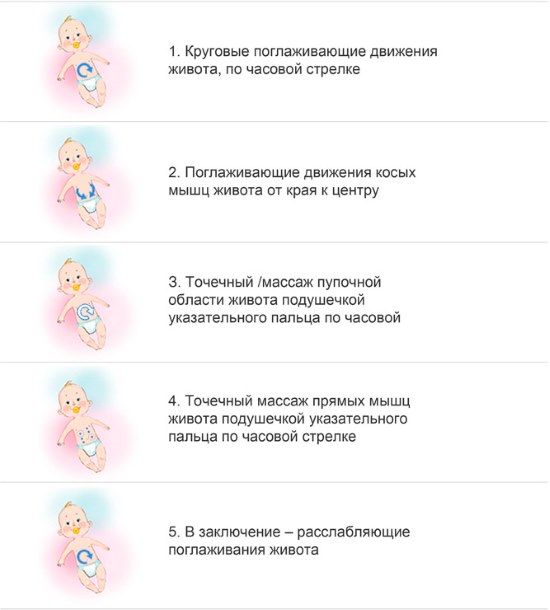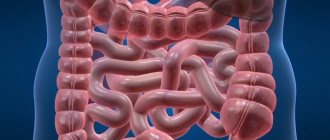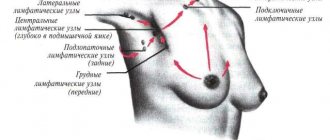Signs of constipation in a breastfeeding baby
Constipation in a breastfed baby is quite rare, since mother's milk contains enzymes that improve the digestive process.
Experts insist that young parents should be concerned if the baby is not gaining weight well. According to doctors, in addition to a change in stool frequency (less than 1 time per day), the main signs of constipation in a breastfed baby are:
- a sharp change in the nature of the stool (excessive density, putrid odor);
- refusal to eat;
- bloating and discomfort when pressed lightly;
- restlessness and tension when trying to defecate;
- frequent pulling of the legs towards the chest;
- lethargy and restless sleep.
If there are several signs of constipation in a breastfed baby, immediately seek help from your pediatrician. The baby's condition may worsen due to the entry of toxins from feces into the body.
Constipation in a breastfed baby should never be ignored, since the reasons for this phenomenon can be quite dangerous for the baby’s health
Preventive measures
As I already said, when breastfeeding, problems with stool are a rare occurrence. If a young mother follows simple recommendations, constipation will not bother her child, but prevention will not hurt.
For prevention purposes it is necessary:
- lay the baby on his tummy at least three times a day (this procedure will not only relieve the baby from constipation, but will also help him cope with colic);
- warm the tummy with a warm diaper (you can also lay the baby on your tummy - this also helps eliminate colic; instead of a diaper, you can use a woolen scarf);
- give the baby a tummy massage (this procedure will relieve the child of abdominal pain and help the passage of gas);
- perform light exercises (raise the baby’s legs to the tummy - this light complex helps the passage of feces and the passage of gas).
Be sure to monitor your baby's health! If you notice changes in his behavior or a worsening of his condition, call a doctor!
And I will say goodbye to you, but not for long! If you found this article useful, recommend it to your friends. And subscribe to my updates. Bye bye!
Causes of constipation in infants
Both for prevention and for subsequent correct treatment of constipation in a breastfed baby, it is important to understand the causes of its occurrence. Experts identify the following most common reasons:
- Changes in the composition of a mother's breast milk as a result of a sudden change in diet or medication. Children's pediatricians advise caution in introducing foods that are previously unfamiliar to the baby into the diet of a nursing mother, and also take medications only as prescribed by a doctor.
- Insufficient amount of fluid, especially during hot periods.
- Increased temperature during teething, infection in the body.
- A stressful situation provoked by forced separation from the mother or other sudden changes.
- Impaired intestinal motility due to incompletely formed nerve endings on its walls or the functioning of the digestive system as a whole.
- Anatomical defects or pathologies of the digestive system.
Breast milk can be completely absorbed in the baby's body. If the frequency of bowel movements has decreased, but the baby is eating well and gaining weight, there is no reason to worry.
Diet of bottle-fed babies before complementary feeding

A mother who does not breastfeed her child can afford much more in terms of nutrition, but this does not mean that she has less worries. She is also responsible for the proper maturation of her baby’s digestive tract. First of all, a formula-fed baby needs a well-chosen milk formula.
No one can guarantee that this particular mixture is suitable, but the pediatrician can give advice on the most suitable composition for the child’s age. If you manage to select the mixture, it is strictly not recommended to change it to another without good reason, since any change in the baby’s diet is stressful. For children with a predisposition to constipation or with signs of dysbiosis, it is advisable to select a mixture with prebiotics in the composition.
Literally 10-15 years ago, there were practically no infant formulas on the domestic market; at that time, artificial infants were fed with cow's milk, diluting it 1 to 1 with water, or goat's milk - 1 to 2. Therefore, even now, many grandmothers are trying to convince young mothers that it is better instead of formula, give infants milk from animals, but in reality this is not so. A newborn is not able to independently digest milk without the enzymes contained in breast milk and formula, which means that animal milk cannot become an alternative food for him.
Also, all bottle-fed babies simply need to be given a sufficient amount of clean water to prevent stool retention.
Constipation in an infant: immediate action
As a rule, it is quite rare to identify the cause on your own, which is why doctors advise, if you have a set of symptoms, to seek help from specialists.
However, to alleviate the child’s condition, parents can take the most harmless actions for the baby, which do not require specialized training.
First of all, this is an abdominal massage, stimulating intestinal motility, as well as flexion and extension of the legs with light pressure on the abdominal area.
A more radical method is the use of rectal suppositories with glycerin. It is better to use them only if the massage option does not produce results. Glycerin, enveloping the walls of the rectum and stimulating them, ensures the sliding of compacted feces and facilitates its removal.
Experts do not recommend that parents use laxatives to treat constipation in a breastfed infant without first consulting a pediatrician.

One of the tests that helps determine possible pathologies if constipation occurs in a breastfed baby (the reasons are different, but the signs are easy to recognize) is a blood test
Tests and rules for collecting them in a baby with constipation
To get a complete picture of the child’s condition and identify possible pathologies, the pediatrician will prescribe a series of tests:
- blood for biochemical analysis;
- general blood analysis;
- stool analysis for impurities;
- analysis of stool for intestinal microflora.
Biochemical indicators of a child’s blood reflect the functioning of the internal organs and systems of the patient’s body.
A general blood test, depending on the results, will show the presence/absence of inflammatory processes, cardiovascular pathologies and the state of the immune system in general.
In order for the indicators to be correct, blood from the vein of a breastfed baby is taken after a 2-3 hour break after the last intake of liquid and food.

Mandatory analysis for constipation in infants - stool analysis
Collecting stool from a breastfed baby who is constipated can be challenging. Therefore, to obtain correct indicators, you must adhere to the rules for collecting analysis:
- use a clean diaper or diaper without filler;
- to stimulate defecation, you can use massage or use a gas outlet tube;
- washed with soap and dry pot;
- use a sterile glass or plastic container for transportation;
- at room temperature, feces are suitable for analysis no more than 3-4 hours after defecation;
- In a refrigerator, feces can be stored in a tightly closed container for no more than 8 hours.
Taking different medications can change the value of the indicators, which should be reported to the doctor who ordered the tests.
Rules for performing a tummy massage for constipation in a baby
Massage for constipation in a breastfed baby is the most gentle, natural and affordable remedy.
The technique is quite simple, but there are several basic rules:
- Massage should be performed 1-2 hours before or after meals;
- movements are performed only clockwise;
- movements should be light without excessive pressure;
- massage must be performed several times a day.
Basic movements when performing a massage:

Massage the belly of an infant for constipation
- Not sharp, circular movements with the entire surface of the palm. Performed for 2-3 minutes to relax the sphincter and stimulate the intestines.
- Synchronized stroking with two palms in the direction from the ribs to the bottom of the tummy to relax the oblique abdominal muscles.
- Massaging the umbilical area with point movements with the fingertip in a clockwise direction, with light pressure. After acupressure, it is recommended to repeat relaxing strokes.
Principles for choosing a daily diet for a child

Do not forget that the strengthening effect of some products can be balanced by the laxative effect of other components of the daily menu. For example, serve your child a salad of beets or other high-fiber vegetables for lunch along with a piece of beef, and then there will be no problem with constipation.
You also need to remember the balance of proteins, fats and carbohydrates, because only a full menu can cover all the needs of a small body for growth and development. Food should not only be balanced, but also contain sufficient amounts of vitamins and minerals. The daily menu must include hot first courses, fresh vegetables and fruits, and cereals.
All meals must be prepared in accordance with the principles of healthy eating. You should not follow your child’s lead and allow him to eat fast food and other favorite but harmful delicacies. It is imperative to limit the amount of sweets in your daily diet. Make sure your child drinks enough fluids for their growing body throughout the day.
Medicines for constipation for a newborn (suppositories, microenemas, syrups)
Drug treatment of constipation in infants can only be used after consultation with a pediatrician , since all drugs, to one degree or another, can affect the further development of the baby.
Table of medications used for constipation in breastfed children
| Release form | Name of the drug | The main properties of the drug in the treatment of constipation in breastfed infants | Frequency of use | Impact on the body |
| Candles | Glycerin Glycelax | It works due to the irritating effect of glycerin on the intestinal mucosa and increasing the speed of passage of feces. | Used occasionally to relieve symptoms | Not absorbed. Constant use is addictive. |
| Microclyster | Microlax | Emptying occurs due to irritation of the mucous membrane. | Apply sporadically | Not absorbed. Constant use is addictive. |
| Syrup | Duphalac Prelax Dinolak | Increases the amount of feces due to fluid retention in the intestines, stimulating peristalsis. Sweet in taste and provides a favorable environment for the development of beneficial bacteria | Most suitable for long-term use | Not addictive. |
The use of these drugs without prescription is an exceptional isolated case and is possible only if there is an urgent need to alleviate the baby’s condition. Long-term use of medications and the system for taking them is developed by the doctor individually for each child.
Folk remedies for constipation for babies: fast and effective
At the moment, there are many traditional methods for treating constipation in a breastfed child. There are three most commonly used and time-tested remedies:
- Chamomile decoction , diluted with boiled water, can be given to babies from two weeks, no more than 100 ml per day. It has a beneficial effect not only on the functioning of the gastrointestinal tract, but also on the immune system in general.
- A decoction of fresh or dried fennel seeds , which contains trace elements that help restore the functioning of the digestive system.
- Prune decoction (recommended for children over 6 months), start with 1 teaspoon, gradually increasing the dose.

Due to the underdeveloped systems of the baby’s body and the possible development of allergic reactions, even the use of herbal decoctions must first be discussed with a pediatrician .
Vegetables
Vegetables contain a large number of coarse fibers, which stimulate gastric peristalsis. These substances absorb liquid, diluting stool and provoking the desire to empty the intestines.
Products that are beneficial for constipation:
- beet,
- zucchini,
- pumpkin makes you want to go to the toilet,
- cabbage.
Boiled vegetables in the form of puree can be offered in small quantities to children from 6 months; after one and a half years, fresh vegetables and herbs can be given.
The method of preparing foods may change their properties. Raw carrots make you weak, and boiled carrots cause constipation.
Cauliflower puree is recommended as a first complementary food; it contains many useful substances and does not reduce the risk of allergies. Constipation from cauliflower sometimes occurs in infants. The reason for this may be the wrong choice of vegetable. You need to buy heads of cabbage without dark spots, and before cooking, soak them in water for an hour and a half to remove nitrates.
Foods that cause constipation in children include eggplant and potatoes.
Fruits and berries
They can weaken or strengthen depending on the elements they contain, sugar.
Constipating foods are considered:
- blueberry,
- pomegranate,
- dogwood,
- green apple,
- pear causes gas and constipation,
- quince,
- persimmon,
- bananas.
To normalize stool and induce bowel movements, you can offer the child to taste plums, grapes, kiwi, apricots, currants, strawberries, cherries, cherries, and pineapple. Baked or boiled pureed fruits and berries are given as complementary foods if there are no contraindications. From one and a half years old, you can switch to fresh foods.
For children prone to constipation, dried fruits from dried apricots, raisins, prunes, and figs will help induce bowel movements. You can prepare compote, decoction, make puree, add to porridge, cottage cheese, kefir.
Dried fruits are rich in fiber, magnesium, potassium, elements that normalize intestinal motility and improve the conductivity of nerve impulses that cause bowel movements.
What information is missing from the article?
- More reviews of effective products
- Products that will help with the problem
- How to avoid constipation
- How to relieve pain
Milk
Milk has always been considered beneficial for children, but this only applies to drinks with a short shelf life or homemade ones. It is better to give infants fermented milk products: kefir, unsweetened yogurt, fermented baked milk, bifidok, acedophilus, cottage cheese. Sour milk works as a mild laxative, especially if taken in the morning or at night.
Whole milk products with high fat content cause milk constipation in a child. The same applies to drinks with an expiration date of more than two days. Cow's milk has a different composition from human milk and a baby cannot digest it easily.
The best option would be to consume natural dairy products made from goat milk. They do not provoke allergies and do not contain heavy cow protein.
What not to use for constipation in a breastfed baby
Constipation in a breastfed baby is a rather sensitive topic for many parents, and instead of consulting a specialist, they use “old-fashioned” treatment methods.
Most often, instead of glycerin suppositories, a piece of baby soap is used, which can cause severe irritation of the mucous membrane of the passage and nerve endings.
An enema with water or herbal decoctions is considered a last resort and is used in cases where other means have not helped. Frequent use of an enema threatens to disrupt the intestinal microflora and may aggravate the problem. Experts recommend performing similar procedures on infants in a hospital setting.

An enema, just like baby or any other soap, a thermometer, a cotton swab, etc., should absolutely not be used for constipation in a breastfed baby.
Such manipulation as stimulating bowel function by placing a cotton swab or the tip of a mercury thermometer into the baby’s anus can damage the walls of the passage and cause serious complications during bowel movements in the future.
What not to do
If your baby has problems with stool, you should not engage in amateur activities:
- do not give your baby an enema if you do not have experience (you risk damaging his anus);
- do not light homemade candles (our grandmothers knew how to light candles from soap - but then soap was different);
- Do not “prescribe” medications to your child without a doctor (even the same harmless Viferon can negatively affect your baby’s health).
And don't ignore this problem! In advanced cases, constipation can lead to intestinal rupture! There is no way to do this without surgical intervention!











